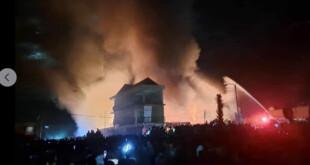Officials in Ethiopia have announced that some 11,607 people have been arrested since a state of emergency was declared in the country early last month.
This is the government’s response to the civil unrest which has gone on for the best part of a year now. Oromo people, who live all over central and southern parts of the country, initially began protesting over the government’s intention to allow Addis Ababa to sprawl into their homelands, which would mean evicting farmers.
However, as ethnic Amhara people rallied to the Oromo uprising, the conflict began to polarise much more longstanding tensions, relating to the disproportionate power that the Tigray ethnic group wield both politically and economically. Despite making up just 6% of the population, they have been the dominant force in Ethiopia since the overthrow of Mengistu Haile Mariam in 1991. The Oromos, on the other hand, are widely oppressed, despite being the country’s largest ethnic group.
Jan Abbink, professor of African Ethnic studies at VU University in Amsterdam, told The World Weekly that whilst the state of emergency may “succeed” in quelling the main wave of protests “in the short term”, it will not create peace going forward.
The vast majority of these arrests have been made in the Oromo and Amhara regions of the country, and represent a much wider crackdown. Mobile Internet and access to social media have been blocked, and foreign diplomats have been banned from travelling too far outside of the capital. More than 500 hundred people have been killed, and prisoners are now being held in six different prisons around the country. Many have fled the unrest already, and by the end of September, Egypt was reporting to have received over 10,000 Oromo refugees.
In the West, Ethiopia has long been seen as a pillar of stability amid the chaos of the horn of Africa. This has allowed it to become a key ally in the fight against al-Shabaab in Somalia, and consequently, a blind eye is being turned to the current government’s authoritarianism.
However, even if mobilised, Professor Abbink underlined that pressure from the EU or US “is not likely to help much” in preventing further abuses. That being said, the West should at least make rhetorical efforts to “hold the Ethiopian government to account on its own statements”, or risk being seen to “condone repression”.




